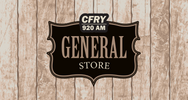Victims of the 60s scoop gathered in Portage la Prairie today, to hold a unity ride in memory of when young indigenous people were taken from their families, and placed in non-indigenous homes.
One is Jeannie Whitebird, from Rolling River First Nation, who was placed in a suburb of Philadelphia. She says the unity ride's important.
"People who were adopted out need to know that they shouldn't have that guilt," she says, "For not having the connection to the families, to their community. This is a way of the community opening its arms, and embracing us back to them."
It's the first unity ride for Constance Calderwood of Winnipeg, whose roots are in North Dakota. She hopes for a healing experience.
"I've learned so much," she says, "Teachings, and stories from everybody of what it was like growing up on a reservation. It's interesting to see stuff that I've never seen before, because I've never been on a reservation."
Monica Zillmer from Swan Lake First Nation took part for the first time as well, and tells us her hopes for doing so.

Beverley Jones from Keeseekoowenin First Nation was taken from her family in 1956, at 2 months old, and calls herself a policy baby. She describes this as a healing process.
"Because a lot of our adoptees have addictions," she says, "There's unresolved abuse. It's a loss of identity, yes, but there are other losses in there that we have to deal with. And because of what happened there, we try to survive."
At the end of the ride, the participants joined a mini-pow wow on the grounds of the Rufus Prince Building, in the shadow of the former residential school.













